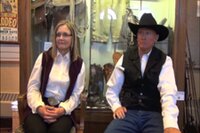| Title |
Brown, Ron and Ginger OH15_002 |
| Creator |
Weber State University, Stewart Library: Oral History Program |
| Contributors |
Brown, Ron, Interviewee; Brown, Ginger, Interviewee; Rands, Lorrie, Interviewer |
| Collection Name |
Utah Cowboy and Western Heritage Museum Oral Histories |
| Description |
The Utah Cowboy and Western Heritage Museum honors men and women whose lives exemplify the independence and resilience of the people who settled Utah, and includes artists, champions, entertainers, musicians, ranchers, writers, and those persons, past and present, who have promoted the Western way of life. Each year, the inductees are interviewed about their lives and experiences living the Western way of life. |
| Abstract |
The following includes the transcript and a video clip from an oral history interview with Ron and Ginger Brown. |
| Relation |
https://library.weber.edu/collections/oral_history |
| Image Captions |
Ginger and Ron Brown |
| Subject |
Agriculture; Horsemen and horsewomen |
| Digital Publisher |
Stewart Library, Weber State University, Ogden, Utah, USA |
| Date |
2014 |
| Date Digital |
2018 |
| Temporal Coverage |
1961; 1962; 1963; 1964; 1965; 1966; 1967; 1968; 1969; 1970; 1971; 1972; 1973; 1974; 1975; 1976; 1977; 1978; 1979; 1980; 1981; 1982; 1983; 1984; 1985; 1986; 1987; 1988; 1989; 1990; 1991; 1992; 1993; 1994; 1995; 1996; 1997; 1998; 1999; 2000; 2001; 2002; 2003; 2004; 2005; 2006; 2007; 2008; 2009; 2010; 2011; 2012; 2013; 2014 |
| Item Size |
47p.; 29cm.; 2 bound transcripts; 4 file folders. 1 video disc: digital; 4 3/4 in. |
| Medium |
oral histories (literary genre) |
| Spatial Coverage |
Weber County, Utah, United States, http://sws.geonames.org/5784440; New Jersey, United States, https://sws.geonames.org/5101760 |
| Type |
Text; Image/MovingImage |
| Conversion Specifications |
Filmed using a Sony HDR-CX400. Transcribed with Express Scribe. Digitally reformatted using Adobe Acrobat XI Pro. |
| Language |
eng |
| Rights |
Materials may be used for non-profit and educational purposes, please credit University Archives, Stewart Library; Weber State University. |
| Source |
Brown, Ron and Ginger OH15_002; Weber State University, Stewart Library, University Archives |
| Format |
application/pdf; video/mp4 |
| ARK |
ark:/87278/s6h0t236 |
| Setname |
wsu_webda_oh |
| ID |
104218 |
| Reference URL |
https://digital.weber.edu/ark:/87278/s6h0t236 |
| Title |
Brown, Ron and Ginger OH15_002 |
| Creator |
Weber State University, Stewart Library: Oral History Program |
| Contributors |
Brown, Ron, Interviewee; Brown, Ginger, Interviewee; Rands, Lorrie, Interviewer |
| Description |
The Utah Cowboy and Western Heritage Museum honors men and women whose lives exemplify the independence and resilience of the people who settled Utah, and includes artists, champions, entertainers, musicians, ranchers, writers, and those persons, past and present, who have promoted the Western way of life. Each year, the inductees are interviewed about their lives and experiences living the Western way of life. |
| Relation |
https://library.weber.edu/collections/oral_history |
| Image Captions |
Ginger and Ron Brown |
| Biographical/Historical Note |
The following is an oral history interview with Ron and Ginger Brown. The interview was conducted on June 3, 2014, by Woodrow Johnson, at the Cowboy and Western Heritage Museum in Ogden. Lorrie Rands is on audio and camera. Ron and Ginger discuss their lives and their experiences with rodeos and traveling acts they performed. They also talk about experiences working with the film industry and animal training as well. |
| Subject |
Ogden (Utah); Agriculture; Horse sports; Horsemanship |
| Digital Publisher |
Stewart Library, Weber State University, Ogden, Utah, USA |
| Date |
2014 |
| Date Digital |
2018 |
| Temporal Coverage |
1961-2014 |
| Item Size |
47p.; 29cm.; 2 bound transcripts; 4 file folders. 1 video disc: digital; 4 3/4 in. |
| Medium |
oral histories (literary genre) |
| Spatial Coverage |
Weber County, Utah, United States, http://sws.geonames.org/5784440; New Jersey, United States, https://sws.geonames.org/5101760 |
| Type |
Text; Image/MovingImage |
| Conversion Specifications |
Filmed using a Sony HDR-CX400. Transcribed with Express Scribe. Digitally reformatted using Adobe Acrobat XI Pro. |
| Language |
eng |
| Rights |
Materials may be used for non-profit and educational purposes, please credit University Archives, Stewart Library; Weber State University. |
| Source |
Brown, Ron and Ginger OH15_002; Weber State University, Stewart Library, University Archives |
| Format |
application/pdf |
| Setname |
wsu_webda_oh |
| ID |
104415 |
| Reference URL |
https://digital.weber.edu/ark:/87278/s6h0t236/104415 |





